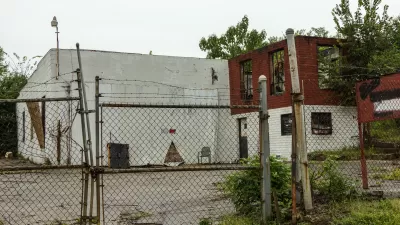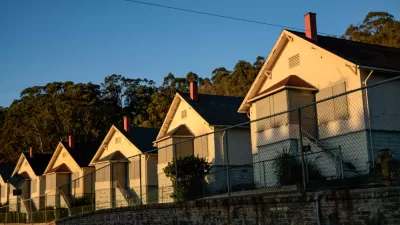A California policy lets cities offer tax incentives to landowners who put vacant lots to use as urban farms or gardens. Long Beach is the latest comer, but the uptake has been sluggish elsewhere.

Long Beach, writes Nina Feldman, is the latest California city to "offer an Urban Agriculture Incentive Zone to landowners, giving tax breaks to those who agree to use their vacant lots for urban farming or gardening for at least five years."
"The state of California passed enabling legislation for such zones in 2013. Since then, San Francisco, San Jose, Sacramento and Santa Clara have put programs into place, but only a handful of landowners have taken advantage of the tax break in those four cities [...]"
The policy sounds swell on paper, but landowners have had challenges lining up the necessary parties and budget. "For the program to work, you need a community-minded property owner with a vacant lot and no plans to develop in the next five years, plus an urban farming nonprofit that's sophisticated enough to come prepared with a budget, all its own equipment and labor, and a five-year plan."
To spur on its own program, Long Beach is taking the added step of penalizing eligible landowners who don't take part. "Effective simultaneously with the opportunity for the UAIZ tax breaks is a $53 monthly penalty for all owners of vacant lots to help cover cleaning fees for plots that become dumping grounds."
FULL STORY: Long Beach Plans to Best Other Calif. Cities in Blight Program

Maui's Vacation Rental Debate Turns Ugly
Verbal attacks, misinformation campaigns and fistfights plague a high-stakes debate to convert thousands of vacation rentals into long-term housing.

Planetizen Federal Action Tracker
A weekly monitor of how Trump’s orders and actions are impacting planners and planning in America.

In Urban Planning, AI Prompting Could be the New Design Thinking
Creativity has long been key to great urban design. What if we see AI as our new creative partner?

How Trump's HUD Budget Proposal Would Harm Homelessness Response
Experts say the change to the HUD budget would make it more difficult to identify people who are homeless and connect them with services, and to prevent homelessness.

The Vast Potential of the Right-of-Way
One writer argues that the space between two building faces is the most important element of the built environment.

Florida Seniors Face Rising Homelessness Risk
High housing costs are pushing more seniors, many of them on a fixed income, into homelessness.
Urban Design for Planners 1: Software Tools
This six-course series explores essential urban design concepts using open source software and equips planners with the tools they need to participate fully in the urban design process.
Planning for Universal Design
Learn the tools for implementing Universal Design in planning regulations.
Gallatin County Department of Planning & Community Development
Heyer Gruel & Associates PA
JM Goldson LLC
City of Camden Redevelopment Agency
City of Astoria
Transportation Research & Education Center (TREC) at Portland State University
Jefferson Parish Government
Camden Redevelopment Agency
City of Claremont





























